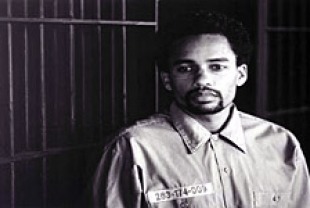Spiritual writer Andrew Harvey has noted: "The very things we wish to avoid, reject, and flee from turn out to be the 'prima materia' from which all real growth comes." This riveting film focuses on the slow but steady inner transformation of Alex (Hill Harper), an African-American former drug addict who is serving a prison sentence of 25 years for rape. He claims to be innocent and that he is incarcerated because he didn't have a good lawyer to defend him.
Alex keeps to himself in prison and refuses to go outside in the yard for exercise. He's bothered by the noise of trains passing by the building even though he sometimes imagines taking them to faraway places. His only regular contact with anyone is meetings with Dr. Coles (Phylicia Rashad), the prison psychiatrist who manages to get him to talk about his troubled relationship with his father and older brother.
Familial wounds and resentments surface when Tony (Obba Babatundé) visits Alex after a 12-month absence. They are uneasy with each other and still locked into good brother versus bad brother roles. Alex convinces Tony to set up a reunion with his parents who weren't at his trial and have not seen him for five years. The problem lies with Alex's proud, stubborn, and domineering father Henry (Billy Dee Williams) who can't forgive his son for wrecking his life after being given all the benefits of a good home and upbringing.
A surprise visitor is Felicia (Rae Dawn Chong), a childhood friend of Alex's who was sexually abused by her father and is a recovering crack-cocaine addict. She pays tribute to the supportive role of her church in helping her change her life. In a strange but powerful way, Felicia's presence has a catalytic effect upon Alex as he slowly softens his heart. In addition, he eagerly looks forward to the next parole hearing.
The Visit was written and directed by Jordan Walker-Pearlman based on a play of the same title by Kosmond Russell. Jean Houston has observed: "It is the closing of the heart far more than the closing of the mind that keeps folk from transforming and deepening." By confronting old family wounds and by breaking down the wall he has built around himself, Alex takes the first positive steps toward personal renewal.
Sometimes we are surprised by the forces that serve as a catalyst for our deepening. This is the case in The Visit, a profoundly simple and moving film. It also confirms a truth that all the world's religions have proclaimed for a long time — visiting the sick, the poor, the lonely, and those in prison brings its own special reward, a sense of inner satisfaction.
